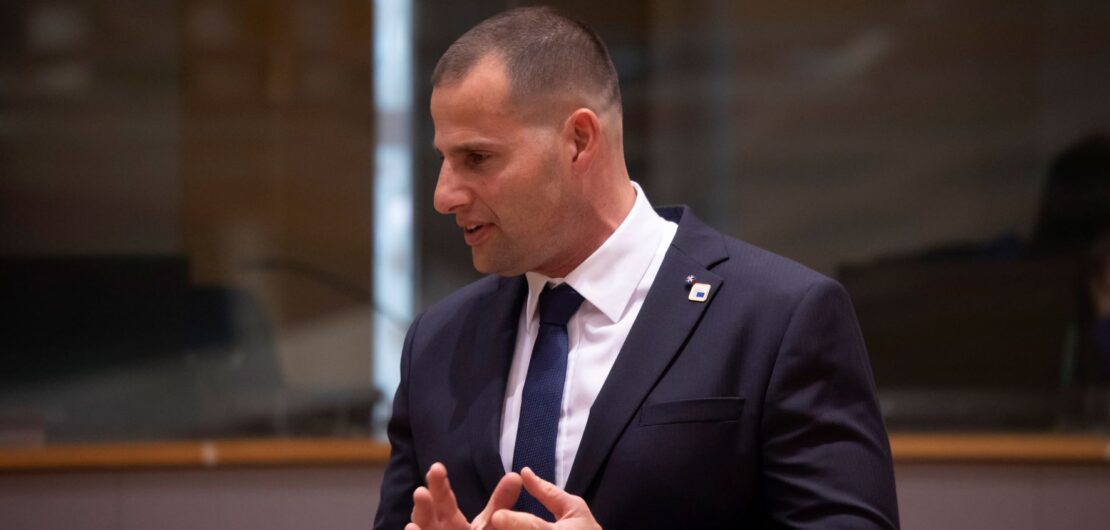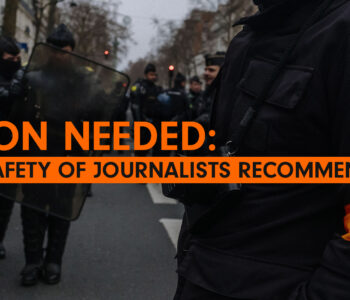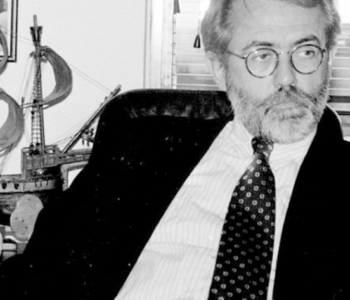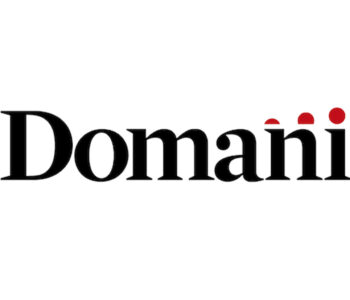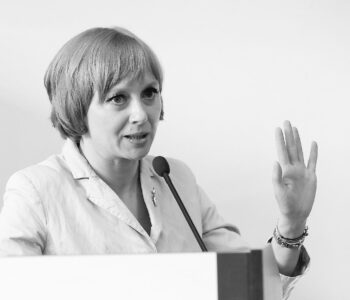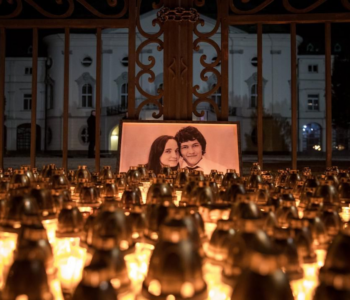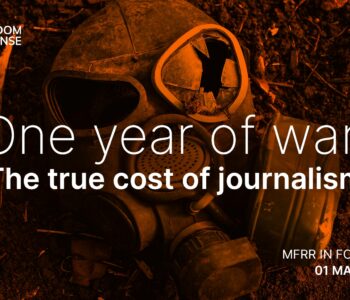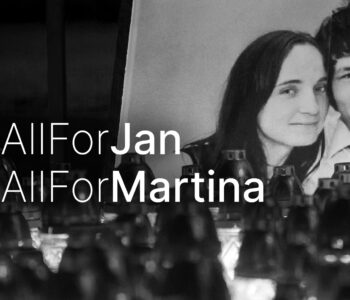By IPI Europe Advocacy Officer Jamie Wiseman
The path to full justice for the double murder has been slow. The hitman and an intermediary are behind bars serving hefty sentences. Now the verdict in the retrial of the alleged mastermind, Marian Kočner, and his associate is expected in the coming months.
Against this backdrop, the messages conveyed during commemorative events this week continue to be the need for full justice, an end to the corrosive culture of corruption and impunity in which the assassination took place, and the need to honour Kuciak’s legacy.
The five-year anniversary also offered an opportunity to look back and reflect on whether, half a decade later, the changes in Slovak politics, judicial authorities, media and society at large have been systemic enough to ensure such an appalling crime is never committed again.
Much has changed in Slovakia since 21 February 2018. Much has not. And while the landscape for press freedom has undergone clear improvement in recent years, there is a palpable sense that, as the country heads into early elections, these gains appear increasingly fragile.
Hard won progress
Turning first to look at the positives, the widespread reforms to the judicial and law enforcement bodies ushered in by the 2020 election victory of anti-corruption party OĽaNO have led to positive changes in how police deal with threats journalists. These issues are taken far more seriously and, since the murder, physical attacks on journalists have been rare.
The sweeping away from power of the Smer-SD party of former Prime Minister Robert Fico – and the subsequent investigations and arrest of high-level officials on corruption charges – have also helped dent the ingrained sense that corrupt elites can act with impunity. Law-enforcement authorities are finally prosecuting corruption unearthed by journalists.
While many challenges remain to unravel this state capture and few high-level convictions have so far been secured, these reforms appear to have helped break down, at least for now, the nexus of political, business and judicial and networks that polluted the rule of law and created the conditions in which a journalist could be killed.
Elsewhere, the recent creation of Safe.Journalism.sk, a platform led by the Investigative Centre of Ján Kuciak (ICJK) for journalists to report threats and receive support, is a timely initiative that can help increase safety amongst the journalistic profession. The engagement of police and prosecutorial authorities in prosecuting attacks reported to them will be vital.
Legislative reforms passed by the current government, approved after consultation with the journalistic community, have also been positive overall. These include the modernisation of media laws in 2022 which strengthened legal protection for source confidentiality for journalists from online media. New rules on the transparency of media ownership and funding – including obligations for declaring media platforms’ ultimate financial owners – should likewise help tackle disinformation and increase citizens’ trust in the news they consume.
At the systemic levels, robust rules on horizontal and cross media concentration continue to ensure the media ecosystem enjoys relatively healthy levels of pluralism, especially compared to other countries in Central Europe. The country’s landscape for media regulation remains independent. A number of new, nimble digital media outlets are successfully experimenting with new business models and providing high quality news.
The landscape for Freedom of Information (FOI) and government transparency have been significantly improved, with Slovakia’s FOI legislation now among the best in Europe. Unique amendments passed in 2022 that ban journalists from being sued for publishing information obtained through FOI should be a model for Europe.
Serious challenges persist
Despite these positive changes, however, media in Slovakia continue to face many challenges in the exercise of free and independent journalism. Most seriously, verbal attacks and denigrating smear campaigns by high-level politicians continue. Vulgar tirades by Fico were replaced by populist attacks by Igor Matovič, former PM and chairman of the governing party OĽaNO. Even on the day of the anniversary, Matovič abused the memory of Kuciak murder to try and delegitimise critical media reporting. While political leaders vow to denounce such threats, their pledges fall short when it comes to members of their own political parties.
This demonization of journalists acts as a signpost for online abuse of journalists and deliberately sows distrust in independent media in the public, fostering further polarization. Worse yet, this harassment is one the rise. According to a recently published survey of more than 400 journalists organized by the Investigative Centre of Ján Kuciak, around two thirds of media workers have experienced some form of threat of attack within the last year. Online harassment is the most common threat. This behaviour is normalized by thin-skinned politicians who see journalists not as watchdogs but as scapegoats. Left unchecked, this divisive rhetoric can – as we tragically saw in the run up to the murder of investigative journalist Daphne Caruana Galizia in Malta – create a climate in which critical and investigative journalists are legitimate and isolated targets for attack.
It is shocking it is that in a country where a journalist was murdered just five years ago, leading politicians continue to launch vicious verbal attacks against the press and apparently having learned nothing.
Meanwhile, the mass, illegal surveillance of journalists carried out before the killing on behalf of Kočner remains unpunished and questions remain unanswered about the possible involvement of individuals within state authorities. Rather than being a thing of the past, the surveillance in 2021 of a prominent journalist from independent media outlet Denník N also bore alarming echoes of the mass surveillance carried out under the previous Fico government.
In the legal sphere, while the Justice Ministry has tabled long overdue amendments to the criminal code, journalists convicted of defamation in Slovakia still face prison sentences of between two and eight years. The current law, though never enforced by the courts, creates a chilling effect and remains among the harshest in Europe. The lack of a functioning majority in parliament makes it unlikely such reforms will be passed before the election. Likewise, a much-needed amendment to the criminal code providing aggravated penalties for crimes committed against journalists due to their work remains parked in the ministry. Though not as prevalent in other EU countries, vexatious lawsuits and SLAPPs pose a serious legal threat.
While the public broadcaster RTVS has benefited from process of depoliticization and the transparent appointment of a respected new Director General, the government failed to win support in parliament for its proposed reforms to the selection process for the Director General and the oversight council. Until these laws governing RTVS are updated, the broadcaster will continue to be open to interference and politicized appointments by undemocratic forces. More pressingly, the scrapping of the licence fees for RTVS by the government as part of its broader budget negotiations has left the broadcaster in a precarious position. Unless a sustainable new financing model is found in the coming months, it will be left operating in a deficit by June 2023.
Oligarchic ownership of many of the country’s largest private media remains a threat to editorial independence This situation worse at the regional and local level, where media face serious threats to their editorial independence due to the proximity to, and financial dependence on, municipal administrations. The lack of transparency in the criteria used for the allocation of state advertising meanwhile continues to pose concerns. A much-criticized levy on the largest private broadcasters, though later scrapped, led to concern about retaliatory taxes in response to critical reporting on the government. It is clear that challenges persist.
Fragile progress in the balance
Hanging over the media landscape in Slovakia is the fact that full justice for the murder of Jan and Martina remains elusive. A date for the new verdict in the retrial has been floated for April 2023. Even if a guilty verdict is reached, appeals to the Supreme Court could drag the case out for many more months. The decision will be closely watched across Europe.
Justice for the families is naturally the prime concern. But if the alleged mastermind is ultimately convicted, it would be an extremely rare example globally in which all those suspected of involvement in the targeted killing of a journalist- from the hitman to the middleman up to the mastermind – are found guilty and put behind bars. This would set a global example and help solidify the rule of law in Slovakia.
Outside the courtroom of the Specialized Criminal Court, progress has undoubtedly been achieved in Slovakia. Trust in the work of police amongst the journalistic community has risen. Reforms of judicial and law enforcement bodies continue. High-level corruption revealed by journalists is being properly investigated. The current government has implemented important legislative reforms that benefit the media.
Yet at the same time, the toxic entanglement of powerful business and political interests is proving difficult to eradicate and can easily return. Denigration and verbal attacks against critical media by high-level politicians continue. Online harassment of journalists and Orbán-style smears against “Soros-funded” media are becoming ever more common. The sense of insecurity for journalists remains.
Taken together then, while there is a perception amongst journalists that the recent changes in the press freedom climate have generally been positive, opportunities for even more progressive reforms were missed and in some areas, particularly online attacks on journalists, the landscape is just as problematic as it was when Jan Kuciak was murdered. The respite experienced by journalists after the killing in terms of verbal attacks is over.
It is clear from the conversations we had in Bratislava with media, civil society, and reform-minded politicians that the recent progress, while significant, is also fragile and has not been fully consolidated. And with anti-democratic forces on the rise ahead of the September 2023 elections – including Fico, who was ousted by protests following the murder – there remains clear room for concern. Regardless of its political persuasion, the next government must commit to keeping the reform agenda on track. Anything less would fail to honour the legacy of Ján Kuciak.
